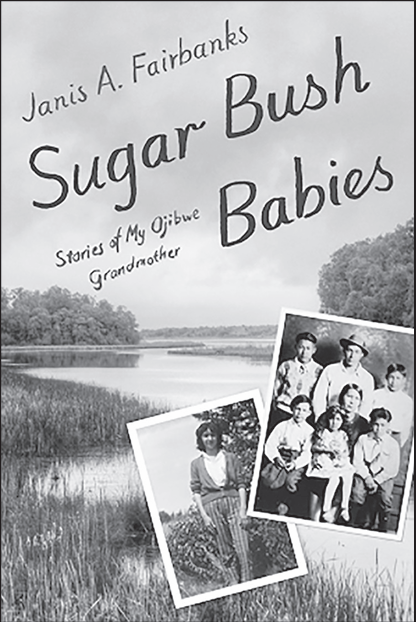Janis Fairbanks laughed when she admitted how busy she has been. Between promoting her new book, working on research projects, and planning more books for the future, retirement isn’t even on the radar for the 78-year-old member of the Fond du Lac Band of Lake Superior Chippewa, and she shows no signs of slowing down.
The day following our interview, Fairbanks was attending an event at the Zenith Bookstore and will visit Drury Lane Books in Grand Marais for an Author Talk and Signing event for her recently released memoir, Sugar Bush Babies: Stories of My Ojibwe Grandmother, on Saturday, October 25
Fairbanks was the first coordinator of the Anishinaabemowin Ojibwe Language Program for the Fond du Lac Reservation and remains active in language revitalization efforts. She also serves on the Editorial Advisory Board for Thunderbird Press (Animikii Mazina’iganan). With a passion for intergenerational wisdom, Indigenous identity, and storytelling, she mentors a local writers’ group, sharing her knowledge and guidance with emerging voices
In Sugar Bush Babies, Fairbanks reflects on her childhood split between Bena, Duluth, and the Fond du Lac Reservation, centering on stories and teachings from her grandmother, Cecelia. From powwows and wash days to lessons in Native medicine and language, the memoir blends humor, tenderness, and cultural insight, offering readers a vivid glimpse into her early life.
“People are curious about how I remember so far back,” Fairbanks said. “It’s so much a part of me. When something comes up and I have to make a decision, those stories just come back to me.”
Fairbanks grew up in Bena, Minnesota, until she was 5, when her family moved to Duluth. She was the fourth of four daughters, followed by three brothers, including a set of twins. Moving from the reservation, where her backyard was woods and lakes, to Duluth, where it was gravel, was a culture shock in more ways than one.
When she began running away from Kindergarten, her parents asked why she kept trying to escape. Fairbanks wanted to go “home,” back to the place where she felt most comfortable in nature. As a compromise, her parents agreed that when she wasn’t in school, she could stay with her grandmother on the Fond du Lac Reservation. Her grandmother’s small home overlooked Big Lake and had neither electricity nor running water.
The compromise proved a happy one, allowing Fairbanks to build a close relationship with her grandmother that would inspire her throughout her life. Through Sugar Bush Babies, Fairbanks captures a different landscape and era while sharing timeless lessons she learned during those years.
As I read the memoir, it was easy to love Fairbanks’ grandmother. Wise, loving, and light-hearted, she had a way of making me laugh out loud throughout the book.
A curious child, Fairbanks admits she was always asking questions. Her grandmother encouraged her to notice details on walks, in the woods, and at school, and to share what she observed. That curiosity and attention to detail stayed with Fairbanks into adulthood, shaping both her work and her perspective.
Currently, Fairbanks is working on a research project about the history of the Fond du Lac Reservation. The project will inform upcoming museum exhibits that, in her words, “illustrate the history of the people from our own perspective.” She is also collaborating with an elder as an editor to help them tell their story.
Fairbanks is also working on a project about her grandmother’s land allotment, which she has been developing for at least 10 years. Another project examines marriage records and their impact on the current Ojibwe population, in collaboration with the Fond du Lac Tribal and Community College’s Thunderbird Press, which is planning to publish an updated version of the book.
After years of attending powwows with her grandmother, Fairbanks was in her late 30s when she saw a photo of herself days after dancing at a powwow. She noticed little girls standing behind her, watching her feet.
“It was unusual because the lineup is that the little girls or the children go to the end of the entry line. But they didn’t. They just came right behind me,” she said. “I felt really happy when I saw those pictures because when I was dancing, I didn’t know they were behind me.”
Dubbing grandmothers the girls “little in training,” Fairbanks said when one of the older of the girls, then around 14, called her grandma, something in her changed.
“She was not young enough to be my granddaughter, but she came out there and called me grandma,” she said. “Something changed a little bit in me hearing that from that young lady.”
Fairbanks has many other stories to tell. Sugar Bush Babies covers her life from birth to age 20, but she has decades of experiences yet to share.
“I could have three more books very easily,” she said. “My life after high school was a whirlwind of activity. I had other adventures that involved a lot of other people and other cultures. It’s just been a lifelong journey of learning, I think. And it’s always involved other people. I learned just by being around people. It’s a learning experience because everybody has different experiences. And when they’re willing to share their experiences with me, then I learn more about people in general.”
Looking ahead, Fairbanks will speak at Drury Lane Books on Saturday, October 25, from 6–7:30 p.m., with doors opening at 5:45. The event is free and open to the public. She will also appear at the Duluth Public Library on November 1 and the Cloquet Public Library on November 13.
Through her memoir, research, and mentorship, Fairbanks continues to share the stories, wisdom, and traditions of her Ojibwe heritage. Her work reminds us that memories and teachings from one generation can shape many more, inspiring curiosity, laughter, and learning for years to come.
For more information about Janis Fairbanks and Sugar Bush Babies: Stories of My Ojibwe Grandmother, visit the University of Minnesota Press website at upress.umn.edu.




